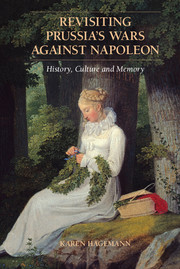Book contents
- Frontmatter
- Epigraph
- Contents
- List of Figures and Maps
- List of Abbreviations
- Acknowledgments
- Revisiting Prussia’s Wars against Napoleon
- Part One A History of Defeat, Crisis and Victory
- Part Two Discourses on the Nation, War and Gender
- Part Three Collective Practices of De/Mobilization and Commemoration
- 8 Military Service
- 9 War Charity
- 10 De/Mobilizing Society
- 11 Honoring and Commemorating War Heroes
- Conclusion
- Part Four Literary Market, History and War Memories
- Part Five Novels, Memory and Politics
- Epilogue Historicizing War and Memory, 2013–1813–1913
- Bibliography
- Name Index
- Subject Index
- Plate section
- References
8 - Military Service
Mobilizing Militiamen and Volunteers
Published online by Cambridge University Press: 05 March 2015
- Frontmatter
- Epigraph
- Contents
- List of Figures and Maps
- List of Abbreviations
- Acknowledgments
- Revisiting Prussia’s Wars against Napoleon
- Part One A History of Defeat, Crisis and Victory
- Part Two Discourses on the Nation, War and Gender
- Part Three Collective Practices of De/Mobilization and Commemoration
- 8 Military Service
- 9 War Charity
- 10 De/Mobilizing Society
- 11 Honoring and Commemorating War Heroes
- Conclusion
- Part Four Literary Market, History and War Memories
- Part Five Novels, Memory and Politics
- Epilogue Historicizing War and Memory, 2013–1813–1913
- Bibliography
- Name Index
- Subject Index
- Plate section
- References
Summary
The extent to which men were marshaled for the militia and volunteered in Prussia in 1813 is one indicator of the scale of the population’s mobilization for war. Even in retrospect, it is remarkable how quickly the monarchy succeeded in the spring and summer of 1813 – despite all adverse circumstances – in marshaling a large field army that, in coalition with the Russian troops, matched the rapidly reconstructed Grande Armée. As a result of mobilization for the militia and volunteer units, the Prussian army grew from 67,000 men in March 1813 to 245,000 in August 1813; 113,000 of them were in the militia. An additional 49,372 volunteers signed up, of whom 24,841 served in the “national regiments,” volunteer rifle (Jäger) detachments and volunteer units such as the Lützow Free Corps and 24,531 in the regiments of the standing army and the militia. Resistance to the introduction of universal conscription among the male population was in general astonishingly small. Many young men even volunteered.
Recruitment for the militia and the volunteer units and their equipment, arming and outfitting were all funded and organized by the local communities and thus required the broad support of the civilian population. The militia and volunteer movement, therefore, needs to be conceptualized as a collective practice of patriotic-national war support. The volunteer movement in particular can only be understood in this way, because each volunteer was only accepted as such if he enlisted fully equipped, armed and outfitted. In the equestrian units, the volunteers themselves, their families and friends or sponsors in the community even had to buy their horses, which was quite expensive. The level of this form of war support naturally differed significantly between the various regions, social strata and ethnic groups of the Prussian monarchy. It correlated, as I will demonstrate in this part, with disparities in support for war charity, the spread of the patriotic women’s associations and the level of acceptance of patriotic-national culture. A more detailed analysis of the regional and social differences in military mobilization within Prussia thus helps us to understand the complex interplay of factors that influenced more general patriotic-national mobilization for war in the old and new territories of the monarchy and far beyond.
- Type
- Chapter
- Information
- Revisiting Prussia's Wars against NapoleonHistory, Culture, and Memory, pp. 177 - 193Publisher: Cambridge University PressPrint publication year: 2015



